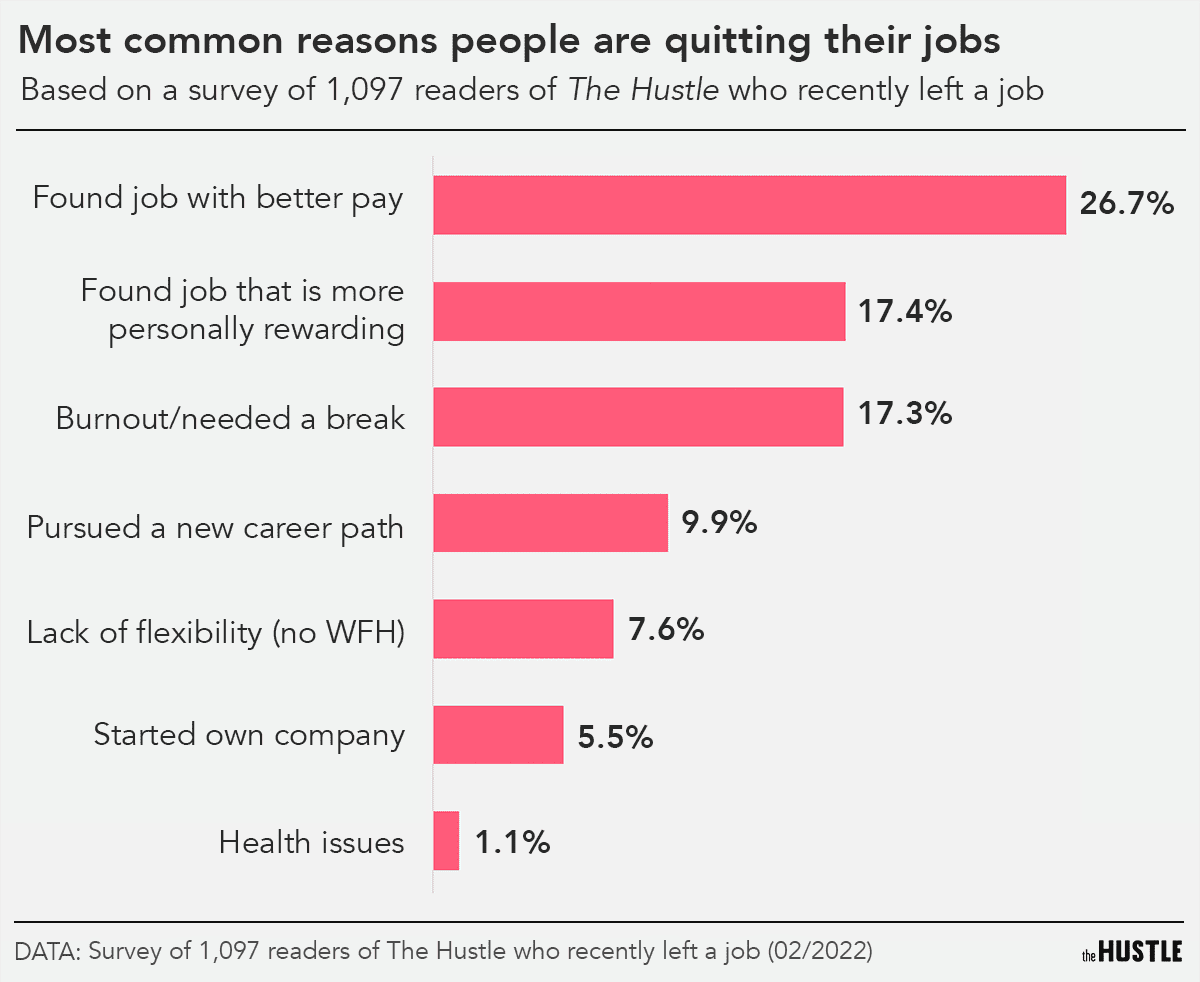A startup cannot prosper without a highly motivated and competent team. This is common knowledge, however, attracting top talent to your early-stage startup is much easier said than done. The best talent in your industry knows how much they are worth. They are a rare commodity in high demand, so it’s very hard to end up on top of the list of projects fighting to attract them.
At the same time, pulling off an innovative startup project with a team that lacks the needed domain knowledge and professional experience is almost impossible. In fact, building a team that lacks the needed qualities to build and market a new product is one of the biggest mistakes you can make as a founder. In order to innovate and disrupt markets successfully, you need to be at the cutting edge of your field (or you need to be incredibly lucky, but it’s a bad plan to rely on that possibility).
Table of Contents:
Since the beginning of the pandemic, however, there has been a noticeable increase in the number of people leaving their job – some people call this movement The Great Resignation. According to Federal Reserve data, the number of people voluntarily leaving their jobs has increased from 2.3% to 3% since the start of the pandemic (this represents an increase of 30%).
Why this is happening is anybody’s guess, but it might provide a good opportunity for interesting startup projects to try to catch some of the top talents leaving the world of big corporations, especially if you can offer to these people the things they lacked in the corporate world.
In their Great Resignation Survey, the Hustle found that the top three reasons people leave their jobs are:

1. To Attract Top Startup Talent, Offer Top Pay
The problem is, however, that as an early-stage startup project it is impossible to offer the same remuneration as established corporations.
To solve this problem, you can employ two strategies.
1.1 Raise Capital and Offer a Truly Competitive Salary
The first one is to raise capital. If you have good traction, attracting an investor is difficult but definitely not impossible. You should go through our startup fundraising checklist to see if this is a viable option for your project.
If it is, then a fundraising round will directly solve your lack-of-capital problem, and generally speaking, the best way to use investor capital is to build a top-tier team.
If you go this route, you’ll have one distinct advantage over big corps fighting for the same talent. First, since you are in the early startup stages, a solid profit margin is much less important to you than to late-stage businesses. You can over-pay your employees compared to industry averages because the effects of high-quality work on early-stage startups can compound and result in extremely high returns in the long run when the company grows.
A high growth rate is much more important to innovative startups than a healthy profit margin because you are racing to be the first mover in a new market. In winner-takes-all industries, being the first one to dominate the market could translate to orders of magnitude difference in business valuation. This more than justifies your lack of profitability in the growth stages.
1.2 Offer Employee Stock Options
If raising capital is not an option for your project, then your best bet is to offer prospective top talent equity in your project, or more commonly – employee stock options. This way, you would be able to pay less cash now, while at the same time offering significantly higher financial upside to your employees if the company prospers.
Besides decreasing the capital requirements of your business, offering employee stock options has another benefit – it marries the performance of the project with the remuneration of the early team. This is especially valuable because in this manner you motivate your experienced and competent employees to show initiative and pull the project forward, rather than to treat it as a source of a monthly paycheck.
Of course, the downside of both options is that you are diluting your share in the business. That said, in the boom or bust world of startups decreasing your share in the project is more than worth it if you are increasing your chances of success. 20% of $100M is a lot more than 100% of $0.
This is the main reason why at VXP we also work with an equity model with our partners. Sharing in the upside of a project is the best way to align interests and incentives.
2. To Attract Top Startup Talent, Offer Purpose and Belonging
As mentioned, the Hustle study found that 17.4% of the people that quit their job did so because they found a position that is personally more rewarding for them. This is why in our startup team motivation guide we extensively talk about intrinsic motivating factors – they are the key to building a productive startup culture, but they are also extremely important for attracting and keeping top talent.
Startups have a huge competitive advantage compared to large corporations in this regard for two reasons.
2.1 An Innovative Project Offers a Sense of Purpose
When Steve Jobs was looking for a new CEO to run his growing company, he wanted to attract John Sculley – the then CEO of Pepsi-Cola. He succeeded by the now-famous quote:
”Do you want to spend the rest of your life selling sugared water, or do you want a chance to change the world?”
People want their work to be meaningful. This is especially true for the younger generations – a study from Olivet Nazarene University asked more than 2000 people about the importance of meaningful work, and 90% of millennials said that it is “somewhat important” or “very important” that their job has a meaningful impact on the world.
The proposition that Steve Jobs made is one that very few businesses can also make. As an innovative startup with huge potential, however, this is something you can tap into and use to your advantage.
2.2 A Small Team Offers a Sense of Personal Impact and Belonging
One of the most demotivating aspects of working for a huge corporation is that you are by definition a small (and usually insignificant) cog in a huge machine. This means that your personal impact is rarely felt, and that talk about “being a family” rings hollow when you don’t feel any personal connection to most of your colleagues, most of which you don’t even know. This is made even worse by the overbearing bureaucracy that goes hand in hand with big, rigid organizational structures.
In contrast, an early-stage startup team is by definition small. This means that it’s much easier to have a palpable impact on the project with your actions. Moreover, a small team means that you can develop a personal relationship with the other team members, including the founders and other decision-makers.
Of course, when talking about attracting talent, you need to relay this message right from the start. Because of this, it’s good practical advice to hold interviews in your office and to let top prospects meet your team. This way they would get a palpable taste of your culture, which hopefully would be a very positive contrast to the corporate world from which they come.
3. To Keep your Top Startup Talent, Avoid Burning out Your Employees
Unfortunately, unlike the intrinsic motivational factors, this is an aspect in which startups sometimes perform worse than large corps.
While there are founders like Jason Fried who are proponents of a work-life balance and claim it gives better results in the long run, the predominant culture in the tech world is one of extreme work intensity.
The reason for that is simple – there is a sense of urgency in startups. You are racing against time (if you don’t reach certain targets by a certain date, you might run out of funding), and you are racing against competitors to be the first one to find a good product-market fit and to become the market leader.
Since the performance of the project, as mentioned, is often tied to the pay of the team, 80-hour workweeks are an unfortunately common sight.
Of course, having a productive team is non-negotiable. However, the reason you are searching for the top talent in your industry isn’t that they can work longer hours than other people. It is mostly because their competence and experience help them take better decisions. Investing a thousand hours in building the wrong thing is useless.
In that sense, hard work is important, but it is only an amplifier of the fundamental variable, which is high-quality work.
All things considered, in order to keep your top talent on board in the long run, it’s important to try to prevent burnout. Of course, there are multiple ways to do that. To continue our example, a 4-day workweek in down seasons is something Jason Fried practices at Basecamp.
That said, the exact best tactic to use is something for you to decide, as the person best familiar with the circumstances of your project.
4. To Attract and Keep Top Talent, Be One Yourself
This seems like non-advice, yet it’s very hard to keep high-quality professionals if you are not one yourself.
This doesn’t necessarily mean that you need to have more experience than your team. On the contrary – attracting people that complement your skillset and compensate for your shortcomings is a great idea.
However, you need to show your domain expertise and the professional attitude you have to the project. People wouldn’t be willing to invest their time and effort in a project if they don’t believe you have what it takes to pull it off.





